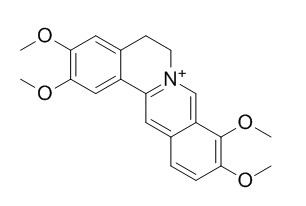Description
Palmatine is an orally active and irreversible indoleamine 2,3-dioxygenase 1 (IDO-1) inhibitor with IC50s of 3 μM and 157μM against HEK 293-hIDO-1 and rhIDO-1, respectively. Palmatine can also inhibit West Nile virus (WNV) NS2B-NS3 protease in an uncompetitive manner with an IC50 of 96 μM. Palmatine shows anti-cancer, anti-oxidation, anti-inflammatory, neuroprotection, antibacterial, anti-viral activities.
Solubility
DMSO : 100 mg/mL(283.77 mM;Need ultrasonic)
Source
Plants >Rutaceae > Phellodendron amurenseRupr.
Storage
4℃, protect from light
Shipping
Room temperature in continental US; may vary elsewhere.
SMILES
COC1=C(OC)C2=C[N+]3=C(C4=CC(OC)=C(OC)C=C4CC3)C=C2C=C1
In Vivo
Palmatine (50 or 100 mg/kg; p.o.; daily for 7 days) ameliorates DSS (dextran sulfate sodium)-induced colitis and prevents infiltration of inflammatory cells.Palmatine (0-200 mg/kg; i.p.; once) attenuates D-galactosamine/Lipopolysaccharides (HY-D1056)-induced fulminant hepatic failure in mice.Palmatine (0-1 mg/kg; i.p.; 10 days) shows memory-enhancing activity in mice.Palmatine (33.75-135 mg/kg; p.o.; daily for 26 days) can effectively inhibit the growth of HCT-116 xenografts in mice.Animal Model:DSS- induced Colitis BALB/c mice model (8-week-old)Dosage:50 or 100 mg/kgAdministration:Orally, daily, for 7 daysResult:Ameliorated DSS-induced colitis and prevented infiltration of inflammatory cells; remarkably extended the colon length; significantly suppressed the colonic MPO activity. Decreased the levels of colonic inflammatory cytokines (TNF-α, IFN-γ, IL-1β, IL-6, IL-4 and IL-10); Protected mucosal integrity by modulating TJs protein and apoptosis proteins; Restored DSS-induced decreases of TJ protein ZO-1, ZO-2 and claudin-1; Reduced Bax expression and enhanced Bcl-2 expression at the dose of 100 mg/kg, prevented epithelial apoptosis and improved intestinal integrity. Prevented DSS-induced changes of gut microbiota in colitis mice.Animal Model:Male ICR mice (20-22 g), D-galactosamine/lipopolysaccharide (GalN/LPS)-induced fulminant hepatic failure modelDosage:25, 50, 100, or 200 mg/kgAdministration:Intraperitoneal injection, 1 h before the GalN/LPS treatmentResult:Attenuated the mortality and serum aminotransferase activities increased by GalN/LPS. Prevented the increase of serum TNF-α and augmented that of serum IL-10. Decreased the TNF-a mRNA expression and increased the IL-10 mRNA expression. Attenuated the apoptosis of hepatocytes.Animal Model:Swiss young male albino mice, with Scopolamine (HY-N0296)- and diazepam-induced amnesia modelDosage:0.1, 0.5, 1 mg/kgAdministration:Intraperitoneal injection, 10 daysResult:Significantly improved learning and memory of mice at 0.5 and 1 mg/kg and did not show any significant effect on locomotor activity of the mice. Significantly reversed scopolamine- and diazepam-induced amnesia in mice. Significantly reduced brain acetylcholinesterase activity of mice.Animal Model:BALB/c-nude mice, HCT-116 xenograft modelDosage:33.75, 67.5 and 135 mg/kgAdministration:Oral administration, once a day for 26 daysResult:The tumor volume and weight of the treatment group were significantly reduced.
In Vitro
Palmatine (0-100 μM; 42 h) suppresses WNV with an EC50 value of 3.6 μM, and reduce the viral titers of DENV-2 and YFV with EC50 values of 26.4 μM and 7.3 μM, respectively.Palmatine (0-1128 μM; 24-72 h) inhibits colon cancer cell proliferation.Palmatine (0-704 μM; 24 h) reduces AURKA protein levels, induces G2/M phase arrest, and induces apoptosis in colon cancer cells via the mitochondrial associated pathway.
